Cats are known for their grace and quiet demeanor, but sometimes they can produce unusual sounds that may leave their owners concerned.
One such sound is gurgling noises while breathing.
These noises can be perplexing and even alarming, as they might indicate an underlying health issue or simply be a result of harmless quirks in your feline friend’s respiratory system.
In this article, we will explore the possible causes behind a cat making gurgling noises when breathing, how to identify potential health concerns, and when it’s necessary to consult a veterinarian.
- What is Noisy Breathing in Cats?
- Why Is a Cat Making Gurgling Noises When Breathing
- Why is My Cat Making a Gurgling Sound in Their Throat?
- What Does Wheezing In Cats Sound Like?
- What Strange Noises Do Cats Make When Sick?
- The Symptoms of a Cat Making Weird Noises Because They’re Sick
- What Causes A Cat To Wheeze?
- What Is the Treatment for Noisy Breathing in Cats?
- Recovery of Noisy Breathing in Cats
- When Should You Be Concerned About Your Cat’s Wheezing?
- FAQs
- Q: What does it mean when my cat is making gurgling noises when breathing?
- Q: Is it normal for cats to make weird noises when breathing?
- Q: What causes stertor and stridor in cats?
- Q: Can feline asthma cause noisy breathing?
- Q: How are stertor and stridor in cats diagnosed?
- Q: What are some common causes of noisy breathing in cats?
- Q: How are breathing problems treated in cats?
- Q: When should I take my cat to the vet if they are making gurgling sounds when breathing?
- Q: Can breathing noises in cats be prevented?
- Q: Can corticosteroids be used to treat stertor and stridor in cats?
- In Conclusion
Key Takeaway
- Noisy breathing in cats is a symptom where a cat makes unusual sounds, such as wheezing, snorting or gurgling, while inhaling or exhaling.
- A cat making gurgling noises when breathing is often a sign of respiratory distress, possibly due to conditions like upper respiratory infections, asthma, or foreign bodies in the airway.
- Symptoms associated with gurgling noises in cats may include loss of appetite, vomiting, diarrhea, lethargy, or changes in behavior, indicating potential underlying health issues such as digestive disorders or respiratory conditions.
- Vets diagnose gurgling noises in cats through a combination of physical examination, listening to the cat’s breathing, and conducting diagnostic tests such as blood work, X-rays, or computed tomography (CT) scans to identify potential internal masses, respiratory problems, or digestive disorders.
- Cats with gurgling noises are treated based on the underlying cause, which could involve antibiotics for infections, anti-inflammatory drugs for respiratory conditions, dietary changes for digestive disorders, or in severe cases, surgery to remove foreign bodies or tumors.
- The recovery of gurgling breathing in cats depends on the underlying cause and treatment, but generally involves rest, a prescribed diet or medication regimen, and regular follow-up veterinary visits to monitor progress and adjust treatment as necessary.
What is Noisy Breathing in Cats?
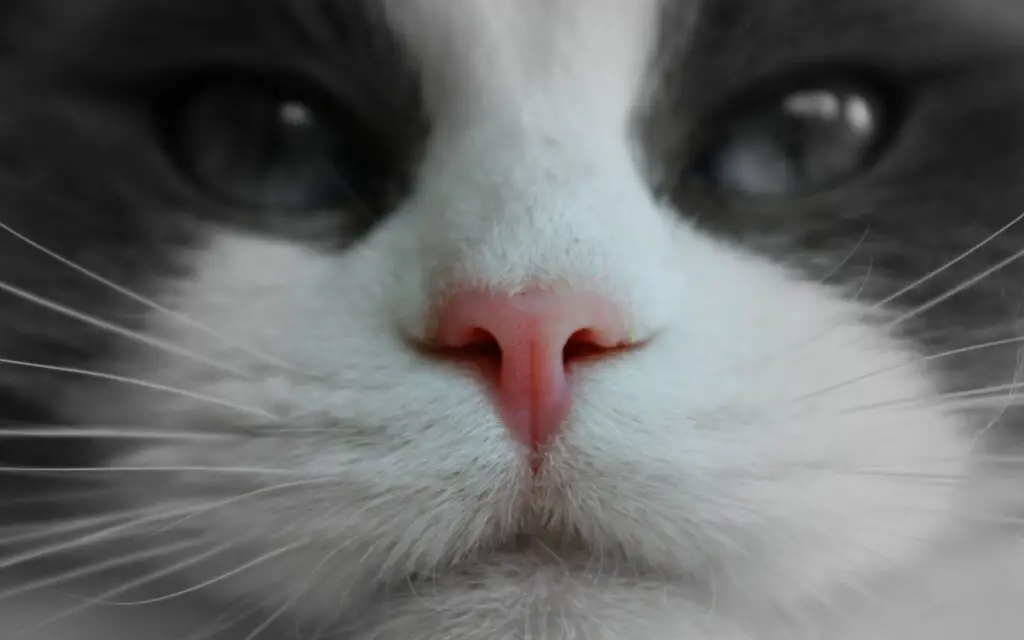
Noisy breathing in cats refers to abnormal sounds or increased volume of your cat’s breath, often indicating respiratory distress or an underlying health condition.
It can have various causes, including respiratory issues, allergies, foreign objects inhaled into the airways, and even obesity.
Some common types of noisy breathing include wheezing, snorting, snoring, and coughing.
The severity of the condition can range from mild to severe, and the symptoms may worsen with time if left untreated.
Owners should be vigilant and seek veterinary attention if they observe signs of noisy breathing. If a cat is struggling to breathe, it could be a medical emergency that requires immediate attention.
The veterinarian will conduct a thorough examination and may recommend further diagnostic tests, such as X-rays or blood work, to determine the underlying cause of the noisy breathing.
Treatment will depend on the cause of the condition, but it may include medication, oxygen therapy, or even surgery.
Prevention is always better than cure, and owners can take measures to reduce the risk of respiratory issues by keeping their cats in a smoke-free environment, avoiding exposure to allergens, and maintaining a healthy weight.
Regular veterinary checkups can also help to detect any underlying health problems and prevent them from becoming more severe. By addressing noisy breathing early on, owners can help their cats breathe easily and maintain a healthy, happy life.
Why Is a Cat Making Gurgling Noises When Breathing
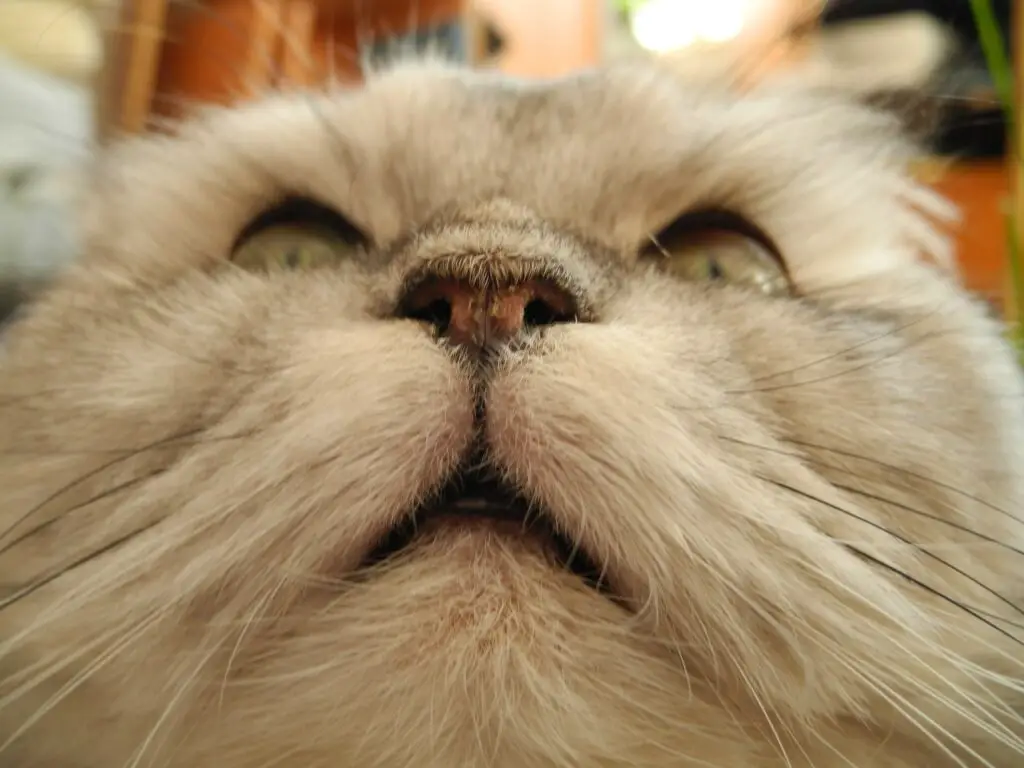
| Reason | How to Spot and Differentiate |
|---|---|
| Feline Rhinotracheitis | Nasal discharge, sneezing, inflammation in the nasal passages and throat |
| Laryngitis | Change in voice, coughing, difficulty swallowing |
| Laryngeal Paralysis | Difficulty breathing, change in voice, possible gagging while eating |
| Pleural Effusion | Difficulty breathing, decreased appetite, lethargy |
| Nasopharyngeal Growths | Difficulty breathing, nasal discharge, snoring-like sound while breathing |
| Respiratory Problems | Coughing, wheezing, difficulty breathing, nasal discharge |
| Stertor | Snoring-like sound during sleep, difficulty breathing |
| Upset Stomach | Gurgling noise shortly after eating, possible vomiting or decreased appetite |
| Blockage in the Larynx or Windpipe | Sudden difficulty breathing, high-pitched breathing sounds, blue gums |
| Feline Asthma | Wheezing, coughing, and difficulty breathing especially after exercise |
| Age of the Cat | In kittens, it could be due to their developing digestive system. In older cats, it could indicate respiratory disease or gastrointestinal issues |
A cat making gurgling noises when breathing can be due to various reasons, including respiratory issues, gastrointestinal problems, or age-related factors. These noises are often a sign that something is not right with your feline friend and should be addressed promptly.
Feline Rhinotracheitis
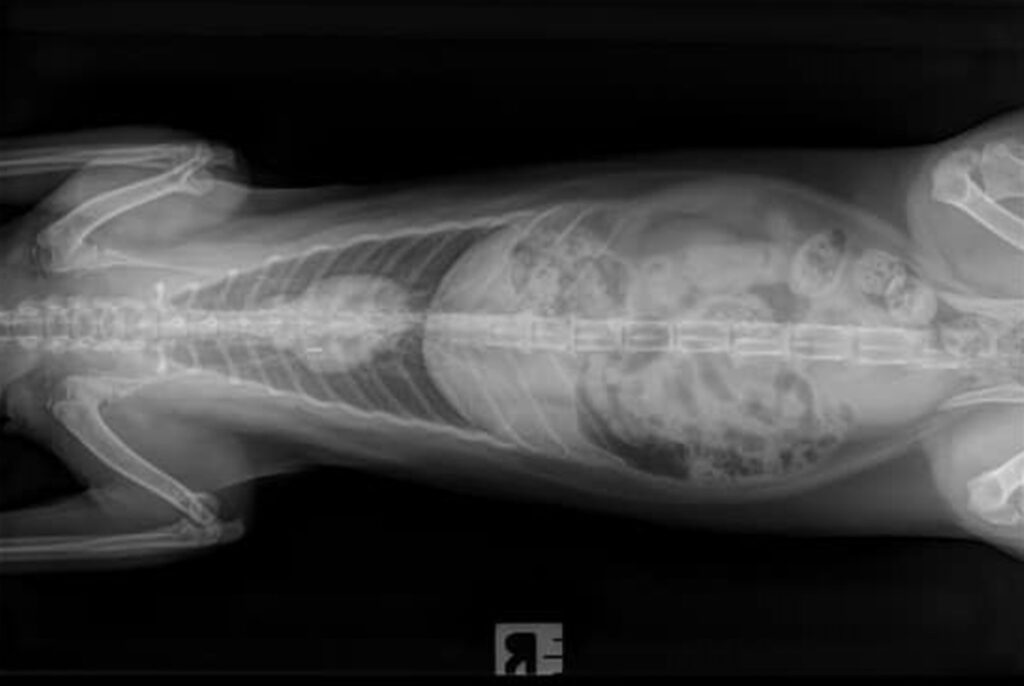
Feline Rhinotracheitis is an infectious disease caused by feline herpesvirus-1 (FHV-1), leading to upper respiratory symptoms including gurgling noises due to nasal and throat congestion.
Feline Rhinotracheitis, primarily caused by FHV-1, is a common and highly contagious respiratory disease in cats.
The infection causes inflammation of the nose and throat, leading to symptoms such as sneezing, coughing, and mucus discharge.
This mucus accumulation can cause gurgling noises when the cat breathes. In my years as a vet, I’ve seen many cases where these symptoms, especially the gurgling noise, cause distress to both the cat and the owner.
Diagnosis
Diagnosing Feline Rhinotracheitis typically involves a combination of physical examination and laboratory tests.
Symptoms like nasal discharge, eye inflammation, and the characteristic gurgling sound while breathing often point toward this condition.
Confirmatory diagnosis is achieved through laboratory tests, such as PCR testing on nasal or eye swabs, which can detect the presence of FHV-1.
Treatment
The treatment approach for Feline Rhinotracheitis is mainly focused on symptom management and preventing secondary infections.
Antiviral medications and antibiotics are commonly used. Supportive care practices, such as ensuring the cat stays hydrated and receives proper nutrition, are also crucial.
From my experience, creating a calm and stress-free environment for the cat aids in recovery.
It’s essential to understand that FHV-1 is a lifelong infection in cats, so regular veterinary check-ups are critical for managing the condition effectively according to VCAHospitals.
Laryngitis
Laryngitis in cats is an inflammation of the larynx that can cause gurgling noises when breathing due to irritation and mucus build-up.
Laryngitis in cats is a condition where the larynx, or voice box, becomes inflamed.
This inflammation often results in symptoms such as coughing, difficulty swallowing, and changes in vocal sounds.
The gurgling noises you may hear are typically a result of mucus and other fluids accumulating in the throat due to this inflammation. In my years as a vet, I’ve seen how distressing these symptoms can be for both the cat and the owner.
Diagnosis
Diagnosing laryngitis involves a thorough physical examination and possibly some diagnostic tests.
As a vet, I look for signs like persistent coughing, changes in the cat’s meow, and difficulty swallowing.
More definitive diagnosis may involve procedures like a laryngoscopy, where a small camera is used to visually inspect the larynx for signs of inflammation.
Treatment
Treatment of laryngitis in cats focuses on addressing the underlying cause of the inflammation and providing supportive care.
This could involve antibiotics if a bacterial infection is present, or corticosteroids to reduce inflammation.
Ensuring the cat is well-hydrated and comfortable is also important. In my practice, I’ve found that most cats with laryngitis respond well to treatment, although it’s important to monitor for any changes or signs of worsening symptoms.
Regular follow-ups with your vet are crucial to ensure recovery and manage any potential complications according to Sharon Lakes Animal Hospital.
Laryngeal Paralysis
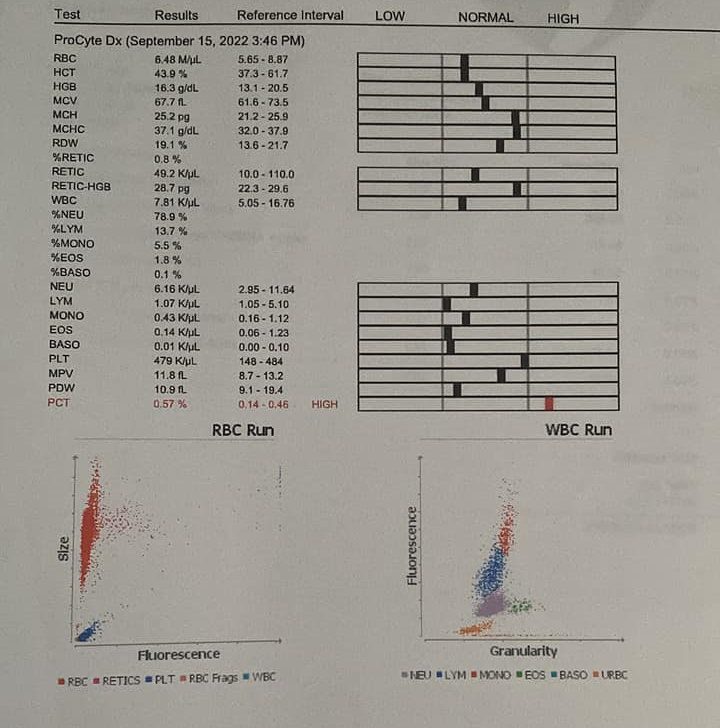
Laryngeal Paralysis is a condition in cats where the muscles that open the larynx during breathing do not function properly, causing abnormal respiratory sounds such as gurgling due to airway obstruction.
Laryngeal Paralysis in cats is a disorder characterized by the inability of the muscles controlling the larynx, or voice box, to function properly.
This results in partial or complete blockage of the airway during breathing. The gurgling noises are often due to the turbulent flow of air through the narrowed laryngeal opening.
In my veterinary practice, I’ve seen how this condition can cause significant distress and discomfort to the affected cats.
Diagnosis
Diagnosing Laryngeal Paralysis can be challenging and typically involves a combination of physical examination and diagnostic procedures.
An important part of the diagnosis is the identification of characteristic signs such as changes in voice, difficulty breathing, and the presence of abnormal respiratory sounds.
In some cases, I might need to perform a laryngoscopy, which allows me to visually inspect the larynx and observe its movement during respiration.
Treatment
The treatment for Laryngeal Paralysis primarily aims to improve the cat’s ability to breathe.
This could involve medical management with anti-inflammatory drugs to reduce swelling and inflammation in the larynx.
In severe cases, surgery may be necessary to permanently open the larynx and alleviate airway obstruction says MSD Veterinary Manual.
From my experience, early diagnosis and intervention are key to managing this condition and improving the quality of life for affected cats.
It’s also important to have regular follow-ups with your vet to monitor the cat’s condition and adjust the treatment plan as necessary.
Pleural Effusion
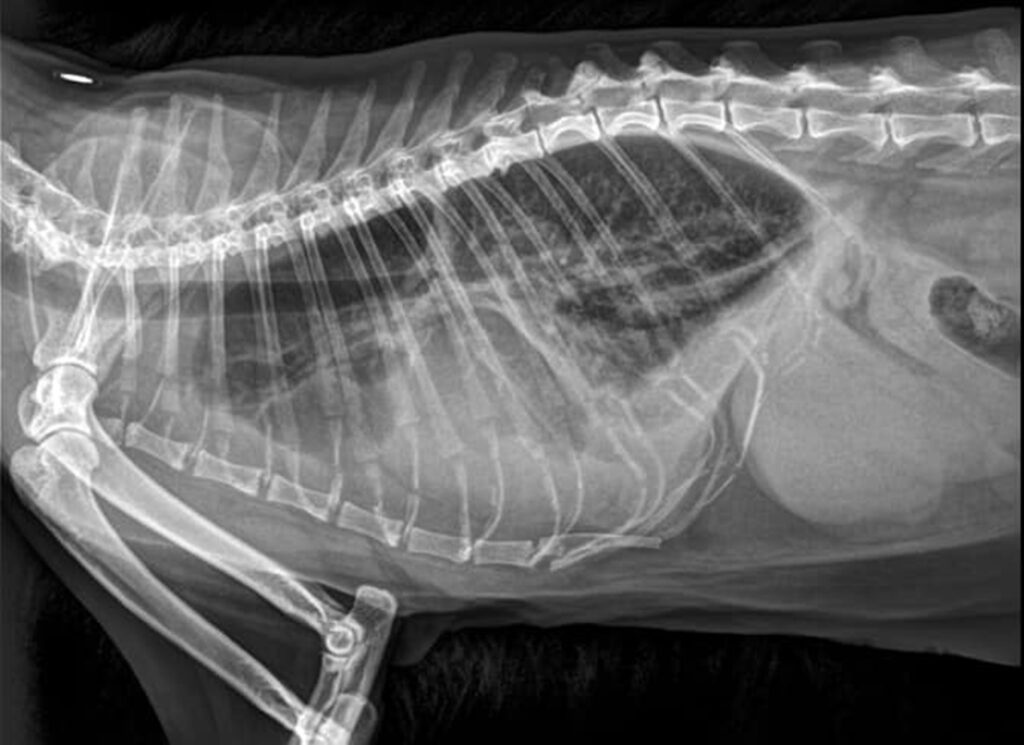
Pleural Effusion is a medical condition in cats where excess fluid accumulates in the chest cavity, causing breathing difficulties and potentially leading to gurgling noises due to fluid interference with normal airflow.
Pleural Effusion is a serious condition where fluid builds up in the pleural space, the area between the lungs and the chest wall.
This can restrict lung expansion, making it difficult for the cat to breathe normally.
The gurgling noises often heard in these cases are usually due to the abnormal movement of air and fluid within the chest cavity. As a vet, I’ve seen how this condition can cause significant distress to both the cat and its owner.
Diagnosis
Diagnosing Pleural Effusion involves a combination of physical examination and diagnostic imaging.
On physical examination, I often note rapid, labored breathing and other signs of respiratory distress.
Diagnostic imaging, such as X-rays or ultrasound, is then used to confirm the presence of fluid in the chest cavity.
In some cases, a sample of the fluid may be taken for further analysis to determine the underlying cause of the effusion.
Treatment
The primary goal of treatment for Pleural Effusion is to relieve the cat’s breathing difficulty by removing the excess fluid from the chest cavity.
This is typically done through a procedure known as thoracentesis, where a needle is inserted into the chest to drain the fluid according to PetMD.
Additional treatments depend on the underlying cause of the effusion, which could range from antibiotics for infections to diuretics for heart conditions.
From my experience, prompt treatment is crucial in managing Pleural Effusion, and regular follow-ups are important to monitor the cat’s condition and prevent recurrence.
Nasopharyngeal Growths
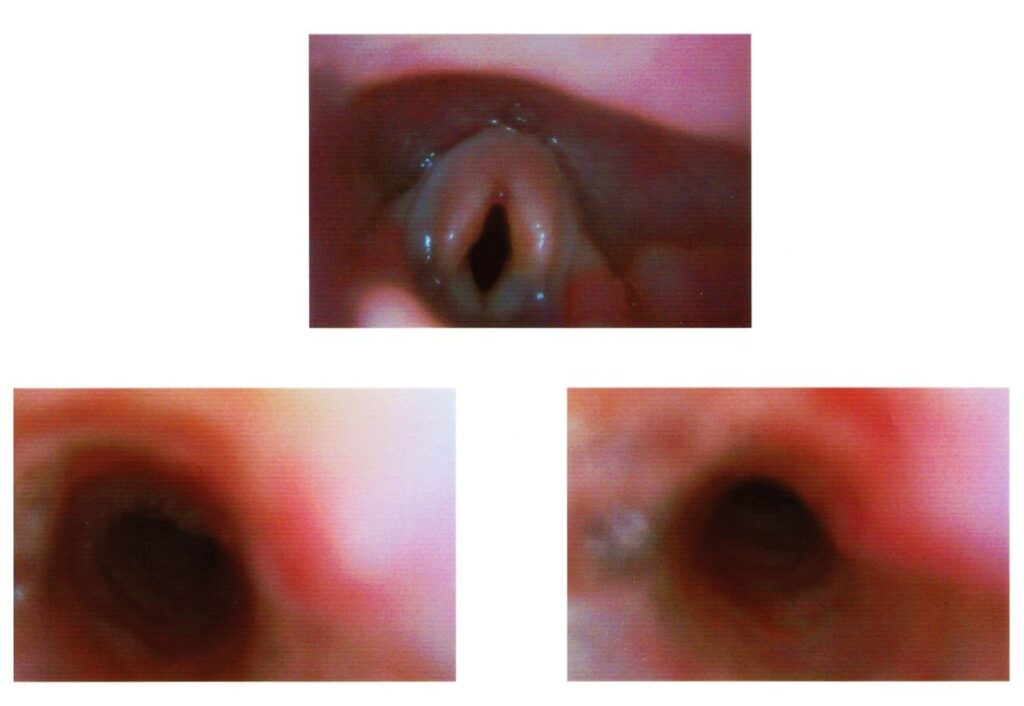
Nasopharyngeal growths are abnormal growths in a cat’s nasopharynx that can cause gurgling noises while breathing due to the obstruction or alteration of the normal air passage.
Nasopharyngeal growths, which can be benign or malignant, occur in the nasopharynx, the area connecting the nasal passages to the throat.
These growths can obstruct or alter the normal air passage, leading to changes in breathing sounds.
The gurgling noises often heard in these cases are usually due to the turbulent flow of air around the growth.
During my years as a vet, I’ve seen how these growths can cause significant discomfort and distress to the affected cats.
Diagnosis
Diagnosing Nasopharyngeal Growths involves a thorough physical examination and diagnostic imaging.
As a vet, I look for signs like persistent sneezing, nasal discharge, and changes in breathing sounds. Diagnostic imaging, such as X-rays or CT scans, is then used to visualize the growth.
In some cases, a biopsy might be required to determine whether the growth is benign or malignant.
Treatment
The treatment for Nasopharyngeal Growths primarily involves surgical removal of the growth to restore normal breathing.
If the growth is malignant, additional treatments like chemotherapy or radiation therapy might be necessary says NLM.
Post-surgery, it’s important to ensure the cat is comfortable and well-cared for during recovery.
In my practice, I’ve found that early detection and intervention greatly improve the prognosis for cats with nasopharyngeal growths.
Respiratory Problems
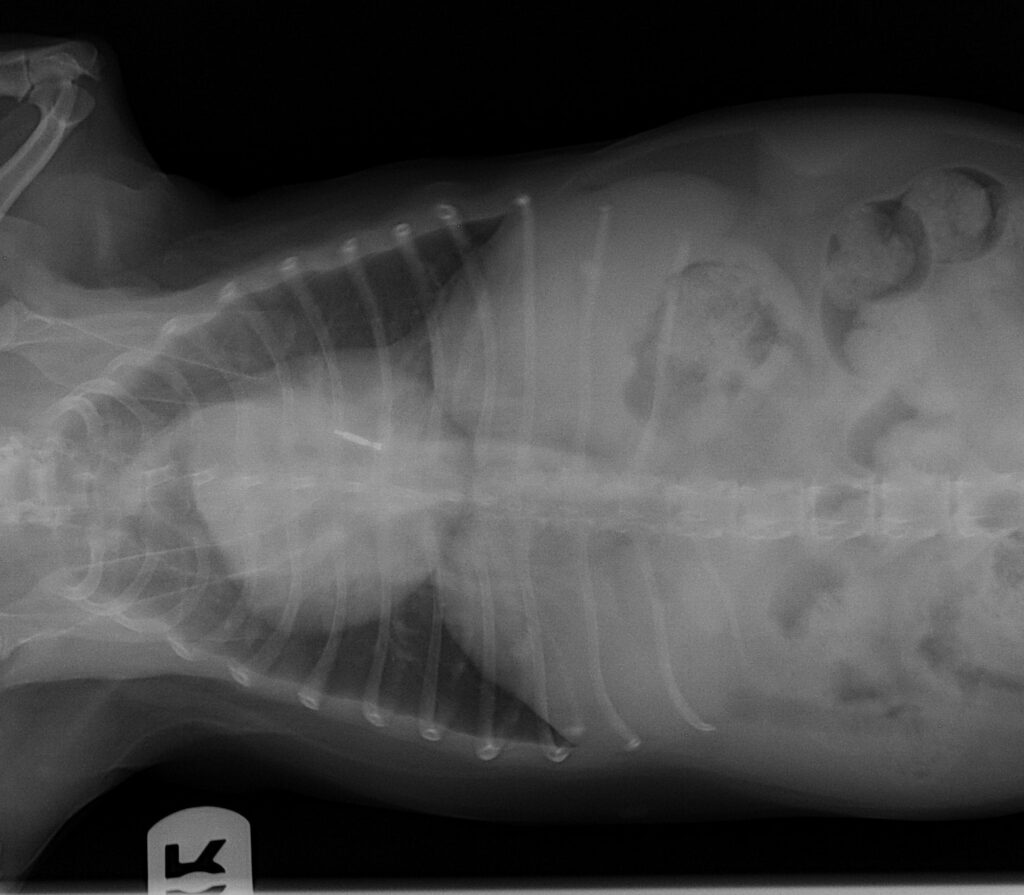
Respiratory problems in cats encompass a wide range of conditions that can interfere with normal breathing and cause gurgling noises due to airway obstruction or inflammation.
Respiratory problems in cats can stem from various causes, including infections, allergies, asthma, tumors, and anatomical abnormalities.
These conditions can lead to inflammation, congestion, or obstruction in the respiratory tract, causing abnormal breathing sounds.
The gurgling noises often heard in these cases are usually due to turbulent airflow through the narrowed or obstructed airways.
As a vet, I’ve encountered numerous cases where respiratory problems have caused significant discomfort and distress to cats.
Diagnosis
The diagnosis of respiratory problems in cats involves a thorough physical examination and a detailed review of the cat’s medical history.
During the examination, I listen carefully to the cat’s breathing and look for signs like coughing, wheezing, rapid breathing, and nasal discharge.
Depending on the suspected cause, further diagnostic tests such as blood tests, X-rays, or endoscopy may be needed to confirm the diagnosis.
Treatment
The treatment for respiratory problems in cats depends largely on the underlying cause.
For infections, antibiotics are typically prescribed, while allergies or asthma may require anti-inflammatory medications or bronchodilators.
In severe cases, or if there’s a physical obstruction like a tumor, surgery may be necessary.
In my experience, early detection and prompt treatment are crucial in managing respiratory problems effectively.
Stertor
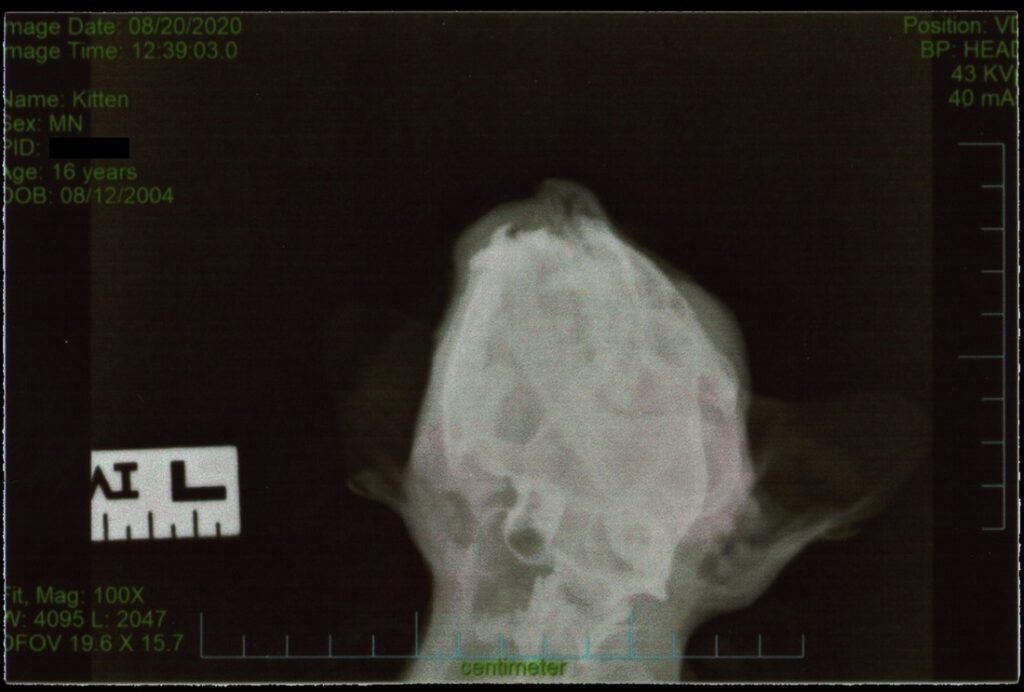
Stertor is a term used to describe noisy breathing in cats, often akin to snoring, which can manifest as gurgling sounds due to partial airway obstruction in the nasal passages or throat.
Stertor is a type of respiratory sound that’s often described as snoring or gurgling.
It’s caused by partial obstruction or abnormal airflow in the upper respiratory tract, specifically the nasal passages or throat.
The gurgling noises are usually due to turbulent air flow around the area of obstruction.
As a vet, I’ve encountered numerous cases where stertor has caused noticeable discomfort in cats, affecting their quality of life.
Diagnosis
Diagnosing the cause of stertor involves a comprehensive physical examination and a detailed medical history.
During the examination, I listen to the cat’s breathing and look for other signs like nasal discharge, facial swelling, or mouth breathing.
Diagnostic imaging, such as X-rays or CT scans, may be necessary to identify the location and cause of the obstruction.
In some cases, an endoscopic examination of the nasal passages and throat may be required.
Treatment
The treatment for stertor depends on the underlying cause of the obstruction. If it’s due to a foreign body, removal is typically the first course of action.
Infections are usually treated with antibiotics, while structural abnormalities might require surgical correction.
In my experience, effective management of stertor greatly improves a cat’s comfort and quality of life.
Upset Stomach
An upset stomach in cats, often caused by dietary indiscretion or digestive disorders, can lead to gurgling noises due to discomfort, nausea, or even changes in breathing patterns.
An upset stomach in cats is a common issue I deal with as a vet. It can be caused by a variety of factors such as dietary indiscretion, food intolerance, ingestion of foreign bodies, or gastrointestinal diseases.
The gurgling noises you may hear are often due to the cat’s discomfort or nausea, which can cause changes in their breathing patterns or even induce retching or vomiting sounds.
Diagnosis
Diagnosing an upset stomach involves a thorough physical examination and a detailed review of the cat’s dietary habits and recent behavior.
As a vet, I look for signs like decreased appetite, vomiting, diarrhea, and abdominal discomfort.
Further diagnostic tests such as blood tests, X-rays, or ultrasound may be required if a serious underlying condition is suspected.
Treatment
Treatment of an upset stomach in cats primarily focuses on addressing the underlying cause and providing symptomatic relief.
If the upset stomach is due to dietary indiscretion, I usually recommend a temporary shift to a bland diet and a gradual reintroduction of the regular diet.
For more serious causes, medical or surgical intervention may be necessary. During my practice,
I’ve found that prompt treatment not only alleviates the cat’s discomfort but also prevents potential complications.
Blockage in the Larynx or Windpipe
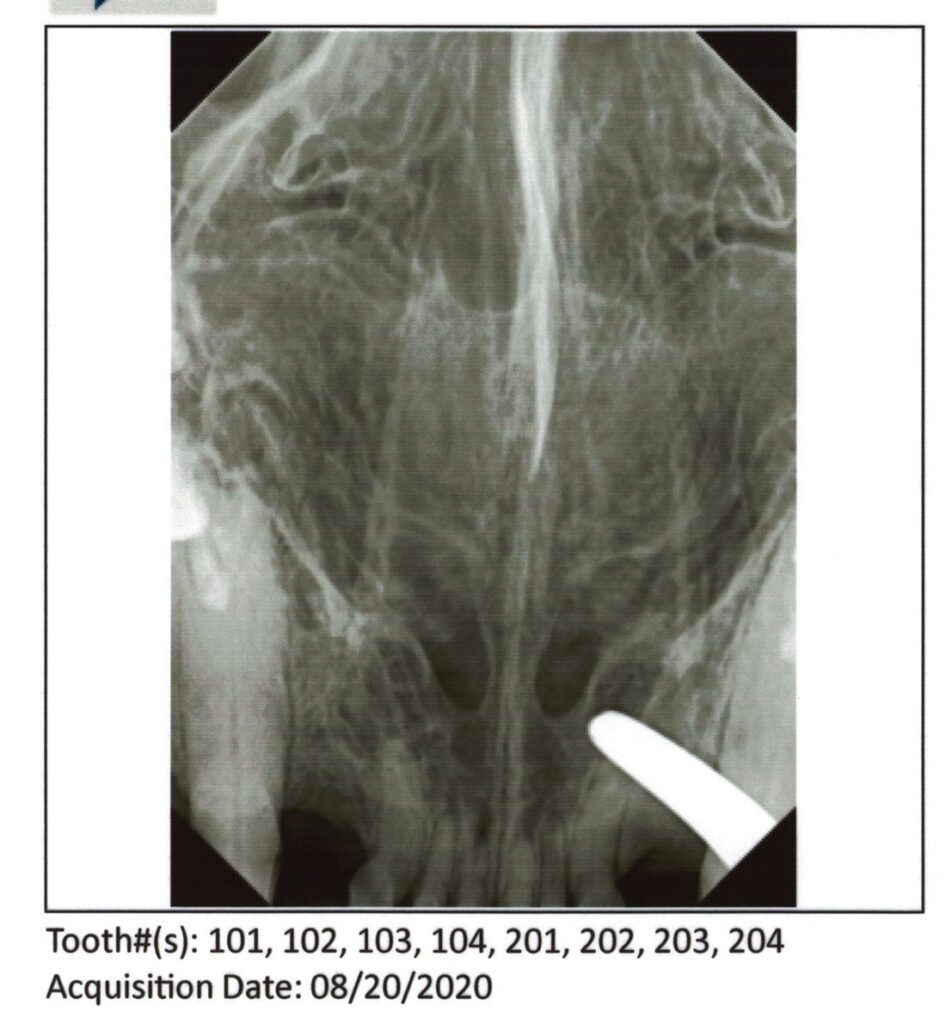
A blockage in the larynx or windpipe in cats can cause gurgling noises during breathing due to disrupted airflow, often signifying a serious medical condition that requires immediate attention.
In my years as a vet, I’ve seen several cases where a blockage in the larynx or windpipe has caused significant distress in cats.
This condition, although not common, is serious and can lead to life-threatening breathing difficulties.
The blockage could be due to various factors such as foreign bodies, tumors, or severe inflammation. The gurgling noises are typically a result of the turbulent airflow around the obstruction.
Diagnosis
Diagnosing a blockage in the larynx or windpipe involves a detailed physical examination, during which I listen carefully to the cat’s breathing and look for signs like coughing, wheezing, and difficulty breathing.
Further diagnostic tests such as X-rays, CT scans, or endoscopy may be needed to visualize the blockage and determine its cause.
Treatment
The treatment for a blocked larynx or windpipe in cats is usually an emergency procedure to remove the obstruction and restore normal breathing.
This may involve sedation or anesthesia, and in some cases, surgery may be required. Post-treatment care often includes medication to reduce inflammation and manage pain.
In my experience, prompt intervention is crucial in these situations, and once the obstruction is removed, most cats recover well with appropriate aftercare and monitoring.
Feline Asthma
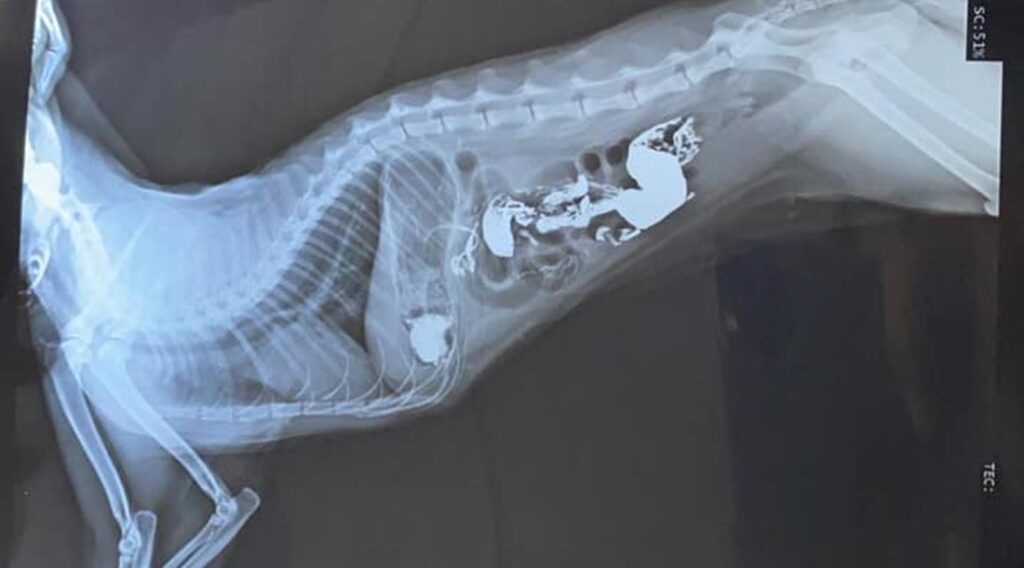
Feline asthma is a condition characterized by chronic inflammation of the lower airways, which can cause gurgling noises in cats due to difficulty in breathing.
In my veterinary practice, I’ve encountered numerous cases of feline asthma.
This condition is somewhat similar to human asthma and leads to chronic inflammation and constriction of the bronchi, the small passageways in the lungs.
A cat with asthma may display signs like coughing, wheezing, and difficulty breathing, which can sometimes sound like gurgling noises as the cat tries to breathe through the narrowed airways.
Diagnosis
Diagnosing feline asthma can be challenging as its symptoms are similar to other respiratory conditions.
Typically, I start with a thorough physical examination and detailed history taking.
Specific diagnostic tests such as blood tests, chest X-rays, or even a bronchial lavage (a procedure to collect cells from the airways) may be necessary to confirm the diagnosis.
Treatment
The treatment of feline asthma aims at reducing inflammation and dilating the airways to ease breathing.
This typically involves corticosteroids to control inflammation and bronchodilators to open up the airways.
In severe cases, oxygen therapy might be necessary. In my experience, with appropriate management, cats with asthma can lead a good quality life says Wikipedia.
Age of the Cat
In kittens, the gurgling sound could be due to their developing digestive system. However, in older cats, it could indicate a more serious health issue, such as a respiratory disease or a problem with the gastrointestinal tract.
Remember, any abnormal noise in a cat’s breathing should be checked by a veterinarian to identify and treat the underlying cause promptly.
Symptoms Associated with Gurgling Noises In Cats
Here are the symptoms of a cat making weird noises because they are sick:
Nasal Discharge
Nasal discharge can range from clear and watery to thick and discolored, depending on the cause. If a cat is making weird noises and exhibits nasal discharge, it might be due to an upper respiratory infection, allergies, or a foreign object lodged in the nasal passage.
Sneezing
Frequent or persistent sneezing in cats can be a symptom of illness, particularly if accompanied by strange noises. Causes can include viral or bacterial infections, allergies, or irritation from environmental factors like dust or smoke.
Coughing
As mentioned earlier, coughing can be a sign of various health issues in cats, such as respiratory infections or heartworm disease. If your cat is making unusual noises and coughing, it’s essential to consult a veterinarian for an accurate diagnosis and appropriate treatment.
Lethargy
If your cat is making strange noises and appears lethargic or less active than usual, it could indicate that they’re feeling unwell. Lethargy can be a symptom of many illnesses, including respiratory problems, fever, or systemic infections.
Loss of Appetite
A loss of appetite in cats can be a sign of sickness, especially when accompanied by unusual noises or other symptoms. Cats may lose interest in food due to respiratory distress, pain, dental issues, or gastrointestinal problems, among other health concerns.
Increased Respiratory Rate or Effort
Labored or rapid breathing, panting, or open-mouth breathing can indicate serious health issues in cats, such as congestive heart failure or lung disorders. If you notice these symptoms along with strange noises, seek immediate veterinary attention.
Change in Vocalization
A change in your cat’s typical vocalization can be another symptom of illness. If your cat starts to make unusual sounds or has a different meow, it could indicate pain, discomfort, or an underlying health issue.
How Vets Diagnose Gurgling Noises in Cats
Vets diagnose gurgling noises in cats by conducting a thorough physical exam, potentially followed by other tests like blood work, X-rays, or CT scans to rule out various health problems.
Physical Examination
As a vet, the first thing I do when a cat is brought in with gurgling noises is conduct a comprehensive physical examination. This involves listening to the cat’s breathing and checking for signs of discomfort.
Blood Work
Blood work can be instrumental in diagnosing gurgling noises in cats. By analyzing a cat’s blood, I can rule out systemic issues like an infection or anemia, which could be causing the symptoms.
X-Rays
X-rays are a useful tool in diagnosing respiratory issues in cats. They allow me to see if there are any obstructions in the airways or abnormalities in the lungs that could be causing the gurgling noises.
Computed Tomography (CT) Scan
In some cases, a CT scan may be necessary to get a more detailed look at the cat’s internal structures. This can help identify tumors, fluid build-up, or other issues that might not be visible on an X-ray.
Stool Test
If the gurgling noises are suspected to be coming from the cat’s stomach rather than its respiratory system, a stool test may be recommended. This can help identify parasites or blood in the gut that could be causing the noises.
Listening to the Gurgling Noises
Sometimes, simply listening to the gurgling noises can provide valuable clues. For instance, if the noises occur primarily after eating, this could indicate an upset stomach or digestive issue.
Checking for Other Symptoms
When diagnosing gurgling noises in cats, it’s also important to look for other symptoms. These may include changes in behavior, appetite, or bowel movements, which could help pinpoint the underlying issue.
How Cats With Gurgling Noises Are Treated
Cats with gurgling noises are treated based on the underlying condition causing the symptom, ranging from dietary changes for simple digestive issues to medication or even surgery for more serious conditions.
Dietary Changes
One of the first steps I often recommend as a vet is dietary changes. If the gurgling noises are due to gastrointestinal issues or food allergies, switching to a hypoallergenic or easily digestible diet may alleviate the symptoms.
Medication
Medication is often used to treat the causes of gurgling noises in cats. For instance, if a cat has a bacterial infection in the gut, antibiotics may be prescribed. In cases of inflammatory bowel disease or similar conditions, anti-inflammatory drugs might be necessary.
Fluid Therapy
If the cat is dehydrated or suffering from gastroenteritis, fluid therapy can be beneficial. It helps to rehydrate the cat and restore electrolyte balance, which can aid digestion and reduce gurgling sounds.
Parasite Control
When gurgling noises are caused by intestinal parasites, a deworming treatment is usually administered. This helps eliminate the parasites, alleviating the symptoms and improving the cat’s overall health.
Hairball Remedies
If hairballs are the cause of a cat’s gurgling noises, there are several treatments available. These range from specialized diets designed to prevent hairball formation to lubricant gels that help the cat pass hairballs more easily.
Surgery
In severe cases, such as when the gurgling noises are due to a tumor or severe blockage in the digestive tract, surgery may be required. This is typically a last resort and is only considered when other treatment options have been exhausted or are not suitable.
Recovery of Gurgling Breathing in Cats
The recovery of noisy breathing in cats depends on the underlying cause, the severity of the condition, and the treatment provided.
Once the cause has been identified and appropriate treatment has been initiated, your cat may experience varying recovery times and outcomes. Here are some general guidelines for recovery:
- Follow your veterinarian’s recommendations: It is crucial to follow your veterinarian’s advice regarding medications, supportive care, and any necessary follow-up appointments. Properly administering prescribed medications and adhering to the treatment plan will increase the chances of a successful recovery.
- Monitor your cat’s progress: Keep a close eye on your cat’s breathing, behavior, and overall health during the recovery process. If you notice any worsening symptoms or new issues, contact your veterinarian immediately.
- Environmental management: Ensure your cat’s environment is clean, comfortable, and free of irritants or allergens that could exacerbate their noisy breathing. This may involve regular cleaning, using air purifiers, or switching to hypoallergenic household products.
- Reduce stress: Stress can worsen respiratory issues in cats. Provide a calm and quiet environment for your cat to rest and recover. Minimize exposure to loud noises or other stressors, and consider providing a safe space where your cat can retreat to if needed.
- Maintain a healthy weight: Help your cat maintain a healthy weight through a balanced diet and regular exercise, as obesity can contribute to respiratory problems.
- Stay vigilant: Even after your cat’s noisy breathing has improved, continue to monitor their health and breathing. Some conditions, like asthma or allergies, may require ongoing management to prevent relapses.
When Should You Be Concerned About Your Cat’s Gurgling?
You should be concerned about your cat’s gurgling if it is accompanied by signs of distress such as vomiting, weight loss, or refusal to eat.
Gurgling sounds in a cat’s stomach are usually normal, signifying that the bowels are functioning as they should.
However, if these sounds are coupled with symptoms like discomfort, vomiting, or weight loss, it could indicate a more serious issue like internal parasites or gastrointestinal disorders.
If your cat stops eating for more than 24 hours or seems to be vomiting more frequently, it is advisable to consult a vet.
From my experience as a veterinarian, I’ve seen cases where a simple change in diet or the administration of anti-parasitic medication has resolved the issue.
Nonetheless, each cat is unique and what works for one might not work for another.
FAQs
Q: What does it mean when my cat is making gurgling noises when breathing?
A: Gurgling sounds in the throat or chest of cats are referred to as stertor or stridor and it indicates some kind of difficulty when breathing. Cats with stertor have noisy breathing due to partial blockage of the upper airway, while stridor indicates a more serious blockage or narrowing of the windpipe or airway.
Q: Is it normal for cats to make weird noises when breathing?
A: No, it is not normal for cats to make any strange noises when breathing. If your feline friend is making any unusual noises such as loud breathing, breathing in your cat should be checked by a vet.
Q: What causes stertor and stridor in cats?
A: There are many causes of stertor and stridor in cats, ranging from respiratory infections and upper respiratory tract obstructions to asthma and nasopharyngeal polyps. All cases should be evaluated and treated individually by a veterinarian.
Q: Can feline asthma cause noisy breathing?
A: Yes, feline asthma can cause loud breathing or wheezing in cats due to inflammation and narrowing of the airways, leading to breathing difficulties. This condition should be properly diagnosed and managed by a veterinarian.
Q: How are stertor and stridor in cats diagnosed?
A: Stertor and stridor are diagnosed by a veterinarian through careful physical examination, including observing the breathing pattern and listening to the breathing sounds. Additional diagnostic tests such as X-rays or blood work may also be recommended.
Q: What are some common causes of noisy breathing in cats?
A: Common causes of noisy breathing in cats include upper respiratory infections, allergies, asthma, tumors, polyps, and brachycephalic breeds (cats with flat faces). These conditions often require veterinary treatment.
Q: How are breathing problems treated in cats?
A: The treatment of breathing difficulties in cats depends on the underlying cause. Treatment may include medications such as corticosteroids or bronchodilators, or surgery to remove obstructions such as polyps or tumors.
Q: When should I take my cat to the vet if they are making gurgling sounds when breathing?
A: You should take your cat to a veterinary clinic as soon as possible if they are making gurgling sounds when breathing, especially if they are also showing other signs of respiratory distress such as coughing, labored breathing, or changes in breathing rate.
Q: Can breathing noises in cats be prevented?
A: Some causes of breathing noises in cats can be prevented by keeping them up to date on vaccinations and regular veterinary check-ups. Other factors, such as breed-related breathing problems, may be managed through surgical intervention or lifestyle changes.
Q: Can corticosteroids be used to treat stertor and stridor in cats?
A: Corticosteroids may be used to reduce inflammation and swelling in the airways of cats with stertor or stridor. However, the treatment plan should always be determined by a veterinarian on a case-by-case basis.
In Conclusion
While cat owners may be initially alarmed by gurgling noises when their feline friend breathes, it’s essential to remember that not all unusual sounds indicate a severe health issue.
Some causes can be harmless or temporary, while others may require veterinary attention.
Carefully observing your cat’s behavior, overall health, and any accompanying symptoms can help determine whether the gurgling noises warrant concern.
If you’re ever in doubt or notice a persistent change in your cat’s breathing, don’t hesitate to consult a veterinarian for professional advice and guidance to ensure your furry companion’s well-being.





Leave a Reply